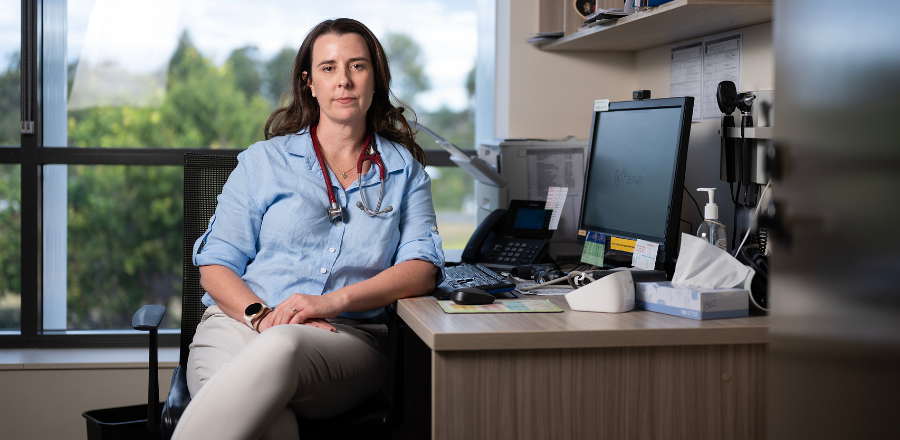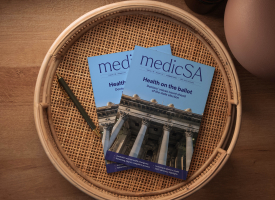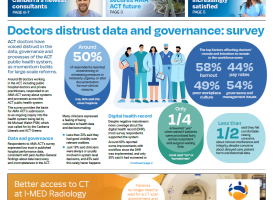Interview with AMA president Dr Danielle McMullen regarding President Trump's remarks about paracetamol and autism
Transcript: AMA President, Dr Danielle McMullen on FiveAA Adelaide Afternoons
Subject: Interview with AMA president Dr Danielle McMullen regarding President Trump's remarks about paracetamol and autism.

LEITH FORREST: I wonder how the medical experts feel about that. The AMA president is Dr Danielle McMullen. She joins me this afternoon. Danielle, thanks so much for your time.
DANIELLE MCMULLEN: Thanks for having me.
LEITH FORREST: I imagine you've had a busy day.
DANIELLE MCMULLEN: It sure has been. I think I'm really worried that pregnant women and their families out there will be feeling nervous and worried and more anxious and guilty than they already do, and that's the last thing we need. Pregnancy is a really stressful time, and it's important that we're getting high quality information out there to women so that they can help make the best possible decision for their pregnancy.
LEITH FORREST: Before we talk about what he said and what you would like the outcome to be from an Australian point of view, can we just wind back somewhat? Us mere mortals, when we hear the President speak, we're never quite sure what's going to come out. When you've got medical experience, when you've got years in the industry, you've got the science, you've got the data, you've got the knowledge, when you heard what he said today, what was your initial reaction?
DANIELLE MCMULLEN: We're also never quite sure what to expect. And as I said, my first reaction was just deep empathy and worry for pregnant women around the world, who now will be feeling even more scared and worried and anxious than they already do and for families who have children with autism who really are just crying out for support for their wonderful children and not more stigmatisation. I think, really, the main thing we've got to do here is try and pick apart, okay, where did this come from? What's the actual advice here and now? And of course, like many things in health, we always need more research, but we can be pretty confident actually in our advice today that really nothing needs to change for pregnant women.
LEITH FORREST: In this day and age, it's all about information and disinformation, isn't it? So what we've found today is that yourself along with the TGA, the Therapeutic Goods Administration, the Royal Australian and New Zealand College of Obstetricians and Gynaecologists, all reaffirming the safety and the benefits of paracetamol when it comes to pregnancy.
DANIELLE MCMULLEN: Paracetamol has been widely used in pregnancy for many, many years, decades and generations. We know that fever, pain, infections can be harmful in pregnancy and that it's important that women have an option of particularly how to treat fever in pregnancy. We also know that you can't use things like aspirin, ibuprofen, so things like Nurofen, Advil, Voltaren, you can't use those medicines in pregnancy, and paracetamol is our safest, best option. It's not that everyone's out there taking it for just the sake of it. If you've got symptoms that need treating, we do have a safe and effective option that's listed as Category A. It's been reviewed by the TGA as safe in pregnancy, and we should be confidently still supporting women who've got symptoms to be able to use an effective medication like paracetamol.
LEITH FORREST: Because I guess when pregnant, you'd like ladies to use as little medication, I guess, as possible, but when it's needed, absolutely do it. If it's safe, if it's been ticked off, if the experts say it's okay, then of course, you can do that for pain and fever.
DANIELLE MCMULLEN: Exactly. Like all medicines, we reduce… we do try and reduce all medications in pregnancy, but when it's needed, this one has been shown to be safe to use.
LEITH FORREST: What about fever in pregnancy? What does that tell us? And the reason why ladies and mums would take this, that would be something that would be harmful for the child, would it not?
DANIELLE MCMULLEN: Yeah, well, it's for a couple of reasons. Particularly early in pregnancy, very high fevers can be damaging and so we do encourage women to treat those fevers. But also, it then gets back to the science. Some of these studies that the US Administration has relied on today are big survey-type studies about what happened during pregnancy for people whose children are later found to have autism. And while some of those women when pregnant might have taken paracetamol, what these studies didn't show is whether the autism actually had anything to do with the paracetamol. Or whether it might have been due to the fever or due to some other medication, or in fact, due to nothing to do with any of that at all and that these are just what we call confounding factors.
They're not great quality studies. And while they have what we call an association, there's plenty of other studies that also show there's no association. So, we've just got to be really pulling apart that evidence, look at what does the bulk of the science say. And that is that paracetamol is safe and not known to be a causing factor of autism.
LEITH FORREST: Isn't autism, from what I'm led to believe, isn't it genetic or is it environmental? Do we actually have the science on that? Do we know what causes autism?
DANIELLE MCMULLEN: I wish we knew all of the answers. The majority of the contributing factors are genetic. There's over 100 genes that have been linked with autism. But how that then displays and quite differently in different children may be down to different genetics and also some different environmental factors. And there's still a whole lot of research going into how do we understand that better. And of course, that research needs all the support it can get and to continue.
LEITH FORREST: How do you get the message across, Danielle? Because I know what will happen. We'll get talkback callers today who will find one doctor or two doctors somewhere who will agree with the President and they'll say you're only listening to one side of the coin.
DANIELLE MCMULLEN: I think we get through it by being open and transparent. I think we've been clear in saying there are some studies that show an association, but there are plenty that don't show — that show there's no association, there's nothing causative, and that the science and the medical profession is really taking all of this seriously and really wants to convey the advice that, on the basis of the information we've got today, there shouldn't be a change in advice to women. They should be confident in taking paracetamol. And we're out there kind of sharing that understanding of how to help interpret the science, how to help media report on science. And at the end of the day, obviously, if you've got individual questions, the best advice is always to talk to your doctor.
LEITH FORREST: Thank you for your time this afternoon. I know you've done more interviews than the Brownlow medallist today, so we do appreciate that. For pregnant women or for families who maybe have a pregnancy in their family right now, what would be your final message for them, the people of Adelaide, 5AA listeners today?
DANIELLE MCMULLEN: Our final message is, despite what we heard out of the US today, there's no change to advice here in Australia. You can continue to use paracetamol in pregnancy for pain or fever. But if you've got any questions at all, obviously go talk to your GP or obstetrician.
LEITH FORREST: Thanks so much. Really appreciate your time.
DANIELLE MCMULLEN: Thank you.
LEITH FORREST: All the very best. Dr Danielle McMullen, the President of the AMA.



